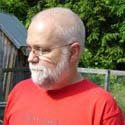[48, 49] Actually, I was recalling the final paragraph of 48 in my last post: "But I do not know whether to say that the figure described by our sentence consists of four or nine elements! Well, does the sentence consist of four letters or nine?--and which are its elements, the types of letters or the letters? Does it matter which we say, so long as we avoid misunderstandings in any particular case?" This is the passage that got me off into logical atomism. What this says to me is that whether we talk about a chair as a single thing, or as sixteen pieces of wood, or as an engineered structure with certain properties, or as some very large collection of organic molecules or even atoms or--why not?--quarks, depends entirely on the context within which (i.e., which language game) we are working. The idea that the "purer" more reductive description is somehow more true just doesn't hold up to practice, though it is pretty easy to see how by generalizing scientific modes one might arrive at that conclusion. For instance, I've been wondering what the active ingredient in Jewelweed is & have even gone so far as to brew a tea of the stuff to try on insect bites & poison ivy rashes; but, if it works, all I will know is that some component of the plant's juice has been extracted & is soluble in water & remains active. Science, legitimately, wants to know what that component is; but by purifying the chemical--if it is a single chemical--what will we have gained in the context of curing skin rashes? None, though in the context of organic chemistry, we will have learned something. But doesn't it amount to a kind of sickness to always insist on the ultimate reduction as the final truth? Anyway, how does W's distinction between naming & describing fit into my example? "Naming is preparation for describing." And then in 50 the whole question of Being is raised, I think, in terms of names & naming.
[50] The present king of France is bald. The sentence, in terms of logical atomism, is meaningless (?) because it has no referent. At least that's the way I'm reading Russell & the various commentaries I've consulted (Glock, Grayling). Now I have empiricist leanings myself, but any theory of language & meaning that does not account for unicorns or centaurs or Zeus or for that matter the pilgrim Dante who travels through the cosmos, or the Mailman or Mr. Slippery in Vinge's True Names, is quite simply a bankrupt theory. A theory born of a kind of insane or manic vision of reduction. Though deeply suspicious of philosophical idealism (at least partly because of its potential political consequences), I nevertheless feel much more comfortable with William Blake's assertion, in The Marriage of Heaven & Hell, that "Everything that is possible to be believed is an image of the truth." It occurs to me just now that the convention of using the present tense when referring to events in works of literature, i.e., Othello murders Desdemona in a fit of jealous rage, suggests that we believe in the present reality of these characters. How then, can we dismiss the literary character called into being by the sentence, The present king of France is bald?
Philosophical Investigations
Christopher Robinson & Joseph Duemer read Wittgenstein's Philosophical Investigations


0 Comments:
Post a Comment
<< Home